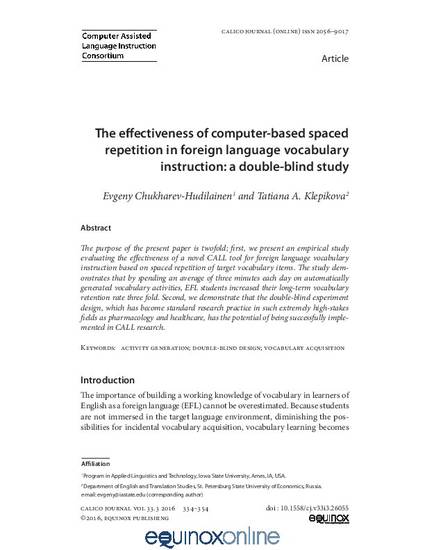
Article
The effectiveness of computer-based spaced repetition in foreign language vocabulary instruction: a double-blind study
CALICO Journal
Document Type
Article
Disciplines
Publication Date
1-1-2016
DOI
10.1558/cj.v33i3.26055
Abstract
The purpose of the present paper is twofold; first, we present an empirical study evaluating the effectiveness of a novel CALL tool for foreign language vocabulary instruction based on spaced repetition of target vocabulary items. The study demonstrates that by spending an average of three minutes each day on automatically generated vocabulary activities, EFL students increased their long-term vocabulary retention rate three fold. Second, we demonstrate that the double-blind experiment design, which has become standard research practice in such extremely high-stakes fields as pharmacology and healthcare, has the potential of being successfully implemented in CALL research.
Copyright Owner
Equinox Publishing
Copyright Date
2016
Language
en
File Format
application/pdf
Citation Information
Evgeny Chukharev-Hudilainen and Tatiana A. Klepikova. "The effectiveness of computer-based spaced repetition in foreign language vocabulary instruction: a double-blind study" CALICO Journal Vol. 33 Iss. 3 (2016) p. 334 - 354 Available at: http://works.bepress.com/evgeny-chukharev-hudilainen/9/

This article is published as Chukharev-Hudilainen, E., & Klepikova, T. A. (2014/2016). The effectiveness of computer-based spaced repetition in foreign language vocabulary instruction: A double-blind study. CALICO Journal, 33(3), 334-354, DOI: 10.1558/cj.v33i3.26055.Posted with permission.